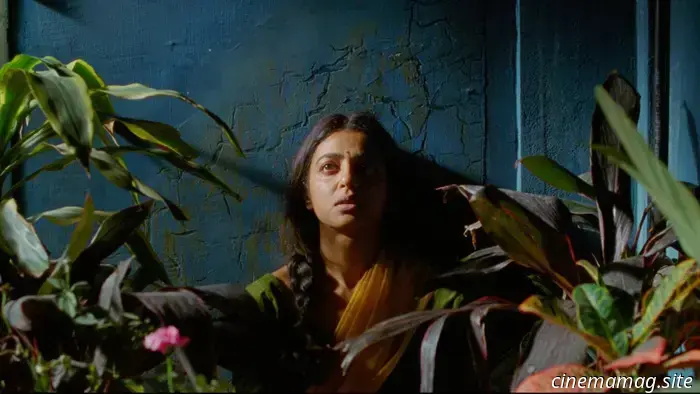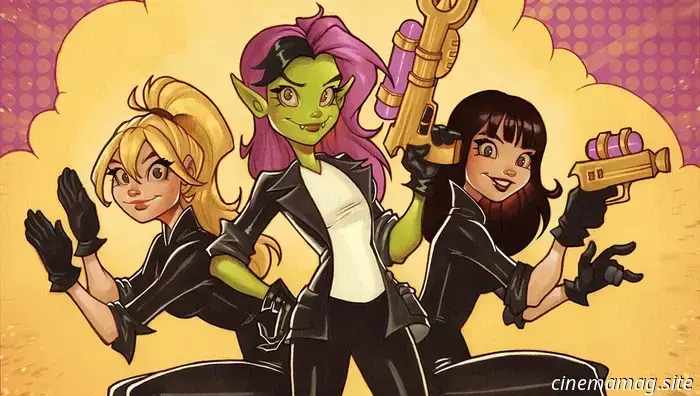
Sister Midnight Review: Quirky Black Comedy Showcases the Contemporary Indian Woman
Recent times have proven to be favorable for films created by or featuring Indian women. Following the Cannes Grand Prix winner All We Imagine As Light, 2024 also witnessed the debut or release of Suchi Talati’s Girls Will Be Girls, Sandhya Suri’s Santosh, and Kiran Rao’s controversial Best International Feature nominee Laapataa Ladies. Adding to this array is Karan Kandhari’s Sister Midnight, an unconventional black comedy that explores the challenges faced by modern Indian women.
The central character is Uma (Radhika Apte), a newlywed who is initially seen on a train heading to her husband Gopal’s (Ashok Pathak) residence. Right from the start, Kandhari allows us to experience the quiet moments of the main characters—until the day unfolds and both Uma and the audience are thrust into the chaos of Mumbai. As a protagonist, Uma is rather, shall we say, “challenging.” She frequently uses the Hindi term for “motherfucker” and struggles even with preparing dinner. Her husband isn’t much assistance either: he hardly seems aware of what sex is, opting for a handshake on their wedding night instead. She largely navigates the city alone, occasionally interacting with her neighbor Sheetal (Chhaya Kadam, from All We Imagine As Light and Laapataa Ladies).
Sister Midnight showcases a particularly deadpan style in both its humor and performances. Kandhari prefers straightforward jokes, like the earlier mentioned handshake or a scene where Uma bolts from the beach after finding herself between two people sobbing on either side of her. Apte mostly adapts to the situation; when she’s not cursing, she’s observing or making sarcastic remarks amidst her more erratic behavior. (A conversation overheard at another wedding hints that her marriage was more about convenience, with her being a psycho and him largely aimless.) Coupled with Kandhari’s carefully crafted compositions—especially in darker scenes—it results in a rather entertaining experience, a unique aspect of Indian cinema, even as you might begin to question its direction.
There are constant indications that something odd is occurring with Uma: her lack of appetite; her complexion becoming increasingly pale. It’s challenging to discuss the direction of Sister Midnight without revealing key plot details, but suffice it to say that based on certain posters and descriptions, you'll find yourself anticipating a significant twist. When it arrives, Kandhari maintains his leisurely pace, introducing more darkly humorous jokes as Uma increasingly frees herself from societal pressures. The forthcoming reveal offers perspective without delivering the necessary impact. One expects it to be more outrageous or unusual, and to be fair, there’s one particularly strange development. However, it’s not quite enough to prevent a sense of mild disappointment, even as Uma’s situation grows more precarious.
At its core, Sister Midnight is a narrative about the constraints faced by Indian women—how it can be so easy to label someone as “crazy” for even slight deviations from the norm. Khandari effectively captures the inherent monotony of being a housewife, even when one finds camaraderie with a neighbor by pretending to be divorced. Despite its laid-back essence, Sister Midnight remains engaging and visually distinctive, bolstered by Interpol’s Paul Banks on the score. It may not fully come together, but neither does Uma—that’s just life.
Sister Midnight is set for a limited release on Friday, May 16.
Other articles
 The 13 Most Outrageous Movies We've Ever Watched
The 13 Most Outrageous Movies We've Ever Watched
 NYC Weekend Watch: The Heroic Trio, Mikio Naruse, John Ford, and More
NYC Weekend Watch is our weekly compilation of repertory events. Museum of the Moving Image is showcasing Johnnie To's The Heroic Trio and To & Ching Siu-tung's Executioners in the See It Big: Stunts! program; John Waters' Serial Mom will be screened on Friday and Sunday; Amir Azizi's Two Dogs will take place on Saturday. Japan Society is presenting an extensive retrospective of Mikio Naruse, which includes many imported films.
NYC Weekend Watch: The Heroic Trio, Mikio Naruse, John Ford, and More
NYC Weekend Watch is our weekly compilation of repertory events. Museum of the Moving Image is showcasing Johnnie To's The Heroic Trio and To & Ching Siu-tung's Executioners in the See It Big: Stunts! program; John Waters' Serial Mom will be screened on Friday and Sunday; Amir Azizi's Two Dogs will take place on Saturday. Japan Society is presenting an extensive retrospective of Mikio Naruse, which includes many imported films.
 Betty & Veronica Friends Forever: Spy Girls - Comic Book Sneak Peek
Archie Comics is set to release the one-shot Betty & Veronica Friends Forever: Spy Girls this Wednesday. You can check out a sneak peek of the issue below with the official preview… INTRODUCING: MEDUSA DOOM, the teenage daughter of the infamous Dr. Doom! Medusa Doom has traveled from afar to torment the citizens of Riverdale, and only Agents B [...]
Betty & Veronica Friends Forever: Spy Girls - Comic Book Sneak Peek
Archie Comics is set to release the one-shot Betty & Veronica Friends Forever: Spy Girls this Wednesday. You can check out a sneak peek of the issue below with the official preview… INTRODUCING: MEDUSA DOOM, the teenage daughter of the infamous Dr. Doom! Medusa Doom has traveled from afar to torment the citizens of Riverdale, and only Agents B [...]
 We Were Dangerous Review: A Coming-of-Age Story of Vibrant Independence and Rebellion
The Matron (Rima Te Wiata) of Te Motu School for Incorrigible and Delinquent Girls is convinced that she is fulfilling God's mission with her three educational principles: "Christianize, civilize, and assimilate." Her belief stems from the fact that these principles rescued her as a wandering Māori teenager seeking direction. She abandoned her roots and adopted the belief that the British
We Were Dangerous Review: A Coming-of-Age Story of Vibrant Independence and Rebellion
The Matron (Rima Te Wiata) of Te Motu School for Incorrigible and Delinquent Girls is convinced that she is fulfilling God's mission with her three educational principles: "Christianize, civilize, and assimilate." Her belief stems from the fact that these principles rescued her as a wandering Māori teenager seeking direction. She abandoned her roots and adopted the belief that the British
Sister Midnight Review: Quirky Black Comedy Showcases the Contemporary Indian Woman
Recent times have been favorable for films featuring or centered around Indian women. In addition to the Cannes Grand Prix winner All We Imagine As Light, 2024 witnessed the debut or release of Suchi Talati’s Girls Will Be Girls, Sandhya Suri’s Santosh, and Kiran Rao’s contentious selection for Best International Feature, Laapataa Ladies. Alongside this collection
